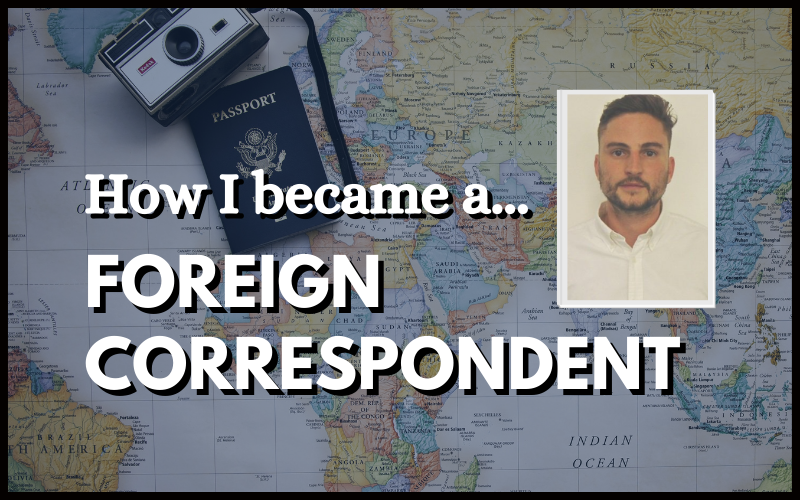Speaking from Mumbai to aspiring journalists gathered via Zoom, Joe Wallen detailed his career as The Telegraph’s south east Asia foreign correspondent, and the path he took to get there.
Here, part-time News Associates trainee Ellen Murphy tells us what she learnt.
Joe entered journalism after realising he wanted to move away from what he called ‘the murky world of political communications’ to report on topics he was more passionate about, and he thought would make a difference.
After completing his NCTJ at News Associates, Joe moved to the south of Spain at the height of the Mediterranean migrant crisis.
He lived between Spain and Morocco covering the crisis for 18 months, becoming a freelance correspondent for various different papers including The Telegraph and Al Jazeera. He began crafting a journalistic reputation within his patch, and built up a wide range of contacts.
“I’m quite an impatient person and I wanted to get into the field immediately after getting qualified,” Joe said.
Joe was then picked up by The Telegraph to work for them full-time and has reported on topics ranging from human rights to the impacts of Covid-19, covering India, Afghanistan, and Pakistan.
Over the last week, Indians have watched as JCB bulldozers have illegally destroyed the homes and businesses of Muslims in Gujarat, Delhi and MP
So, what does Boris do on arrival? He goes and inaugurates a JCB factory and poses on a vehicle https://t.co/C2CQA4iaAy
— Joe Wallen (@joerwallen) April 21, 2022
‘If you’re looking for a 9-5, this isn’t it’
Every morning, Joe produces a news memo of five or six stories that he sends to the London office. Meanwhile, he updates the editors on any long-term feature pieces and investigations he is working on.
“If you’re looking for a 9-5, this isn’t it,” Joe said. He explained how the previous night in Sri Lanka, the military killed a protester, and he had to quickly get the breaking story written.
Stories differ vastly each week, Joe said, who went from covering Mumbai’s carbon neutral plan one week, to reporting on Imran Khan’s resignation in Pakistan the next.
‘Editors will look for a second language’
Joe speaks Spanish, which was a ‘big help’ to him when freelancing in the Mediterranean because he did not have a budget for a translator. Once journalists have a staff job, papers are willing to pay for translators, Joe said, while admitting his Hindi is a ‘work in progress’.
However, when initially establishing yourself as a foreign correspondent, a second language is important as it is one of the first things editors look for, he said.
Thank you very much to @Telegraph South Asia correspondent @joerwallen for an insightful talk on life as a foreign correspondent ✍️ #TeamNA #StartedHere pic.twitter.com/kkQY4hhcAW
— News Associates (@NewsAssociates) April 21, 2022
‘Find a gap in the market’
When it comes to choosing a patch, Joe recommended areas that are under-covered and where there is a gap in the market for stories, such as an area inflicted with an ongoing crisis. From there, Joe said it was vital to establish contacts on the ground, particularly if journalists don’t know the local language.
‘Be ready to travel at any moment’
Joe said: “You have to be ready to pick up a backpack and travel at any moment.”
The line of work has not been all smooth sailing, Joe admitted. He has faced difficulties due to the repression of media freedom in South East Asia and reporting on human rights while trying to avoid deportation has posed a challenge in itself.
Perhaps the biggest challenge for Joe was reporting from India during the pandemic, where four million people died.
He explained how important it was for him to produce hard-hitting and realistic coverage to inform people back home of what was happening.
A good newspaper will support journalists through those negative experiences, he said.
Before reporting from a conflict zone, for example, journalists undertake hostile environment training. Joe named the Rory Peck Trust for its comprehensive training that combines theory and practical tasks such as a staged kidnapping. He said the drills teach you how to react in real-life situations.
‘Rely on your humanity’
Throughout his career, Joe has carried out several sensitive interviews, including with people who have lost family members or have been brutally attacked.
“Some people want to talk to you to raise awareness or tell their story, and that in itself can be quite empowering,” Joe said.
He advised journalists to rely on their humanity and to make an assessment on how the interviewee is responding.
View this post on Instagram
‘Be friendly and approachable’
Joe said when making contacts it is important to be friendly and approachable. Familiarising yourself with other journalists in your patch is invaluable as collaboration can help improve the quality of stories.
Finally, Joe shared his top tips for becoming a foreign correspondent:
- Find a newsworthy patch
- Make contacts in your area
- Take every opportunity and work really hard
- Don’t just stick to your area of interest
The School of Journalism is proud to regularly invite inspiring guest speakers to talk about their lives as journalists, as well as offering free, practical journalism workshops.
Find out more here to get a taster of our award-winning training.

